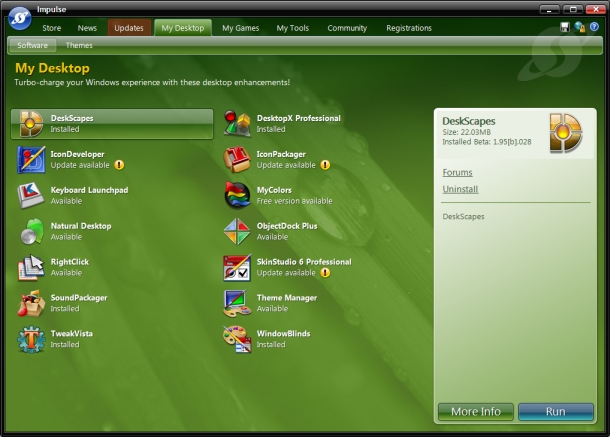
We certainly have no problem getting caught up in the fun of playing games, but the people who create them have their pocketbooks to worry about, too. In this column, finance expert and GameSpy contributor Chris Morris guides you through the tricky corridors the gaming industry's financial side, touching on big-time business decisions and how they matter to the common gamer.
Impulse Buy
The king of the brick-and-mortar gaming world is finally embracing the digital. GameStop's recent purchases of the Impulse digital distribution service and Spawn Labs streaming service won't solve all of its problems, but it sets a course for the company as it prepares for the coming transition -- and it gives investors some much needed clarity into GameStop management's long-term thinking.
These days, GameStop sees annual digital revenues of $290 million from video games. As it expands, though, it expects those numbers to hit $1.5 billion by the end of 2014. "Our customers are beginning to consume games in a hybrid manner, both physical and digital, so we are becoming a hybrid company to meet their needs," says Tony Bartel, president of GameStop. "Both of these programs are designed to sell more of the games we sell today."
The companies that were acquired give the retailer a one-two punch in the digital world. Impulse might be significantly smaller than Steam, but it's not a complete stranger to the space -- and with GameStop's backing and resources, the service can quickly be grown (let's face it: If any company has the leverage to get publishers to drop digital prices, it's GameStop).

Spawn Labs, meanwhile, is an interesting piece of the puzzle. It's a streaming service, like OnLive; this is a field that's still in its infancy (and has no real leader), but one that has tremendous potential for the future. Two things are worth noting. First, Spawn will let customers test games -- whether a demo exists or not. And GameStop intends to offer both PC and console titles through the service, something OnLive doesn't presently do. Secondly, should people decide to buy a game, they'll be able to play it on virtually any screen.
GameStop is already in talks with television OEMs to provide the service to Internet-enabled televisions (as OnLive does with Vizio sets). The initial focus, though, will be heavily skewed toward the tablet marketplace, which Bartel calls "the next explosion in the gaming space."
"Our whole premise is there are a lot of people caught up in the $.99 cent fray, and a lot of people frustrated by that," he says. "We really believe that's a chance for us to lead the tablet playing field."
The company is so focused on tablets, in fact, that it will begin selling them in stores later this year, alongside Xbox 360s, PlayStation 3s and Wiis. And a half-decent chance exists for GameStop to make a tablet of its own.
"If we can work with our partners and the OEMs, and they come up with a great table that is enabled with a great gaming experience and coupled with a Bluetooth controller, then there's no need to go out and develop our own," says Bartel. "But if we can't find one that's great for gaming, then we will create our own."

You're going to have to wait a bit before you try Spawn out, though;.the streaming service is still in testing. The company expects to have two private betas this year, with a wider launch in 2012.
One thing that won't be a part of the company's digital plan is used games. Bartel is certainly counting on digital being a growing part of its revenues, but doesn't believe brick-and-mortar locations are going away anytime soon. And as long as those are around, trade-ins will continue to flow.
"We really don't anticipate having a model [for digital] where people can trade a game back in," says Bartel.
Given GameStop's history, a lot of skepticism abounds about how aggressive the company plans to be in the digital world. Critics have wondered aloud whether GameStop is more interested in slowing down progress in that area of distribution than in moving it forward, allowing it to stretch out the life (and profits) of its real -world locations. Even the companies GameStop purchased had their initial doubts, but GameStop was able to convince them it was serious about growing digital distribution.

"At first, I wasn't sure," says Brad Wardell, CEO of Stardock, the developer of Impulse. "We're a PC game distributor, and we knew GameStop had largely moved to consoles. Also, they're brick-and-mortar -- and we weren't sure we wanted to hand off Impulse to [that sort of company]. We wanted to sell it to someone who wanted to build the digital distribution market for PC gaming. They went to great lengths to demonstrate this was something they were taking very seriously."
Investors seem convinced as well: A week after the announcements, GameStop shares had climbed 7%.
Chris Morris has covered the video game industry since 1996, offering analysis of news and trends, and breaking several major stories, including the existence of the Game Boy Advance and the first details on Half-Life 2.


